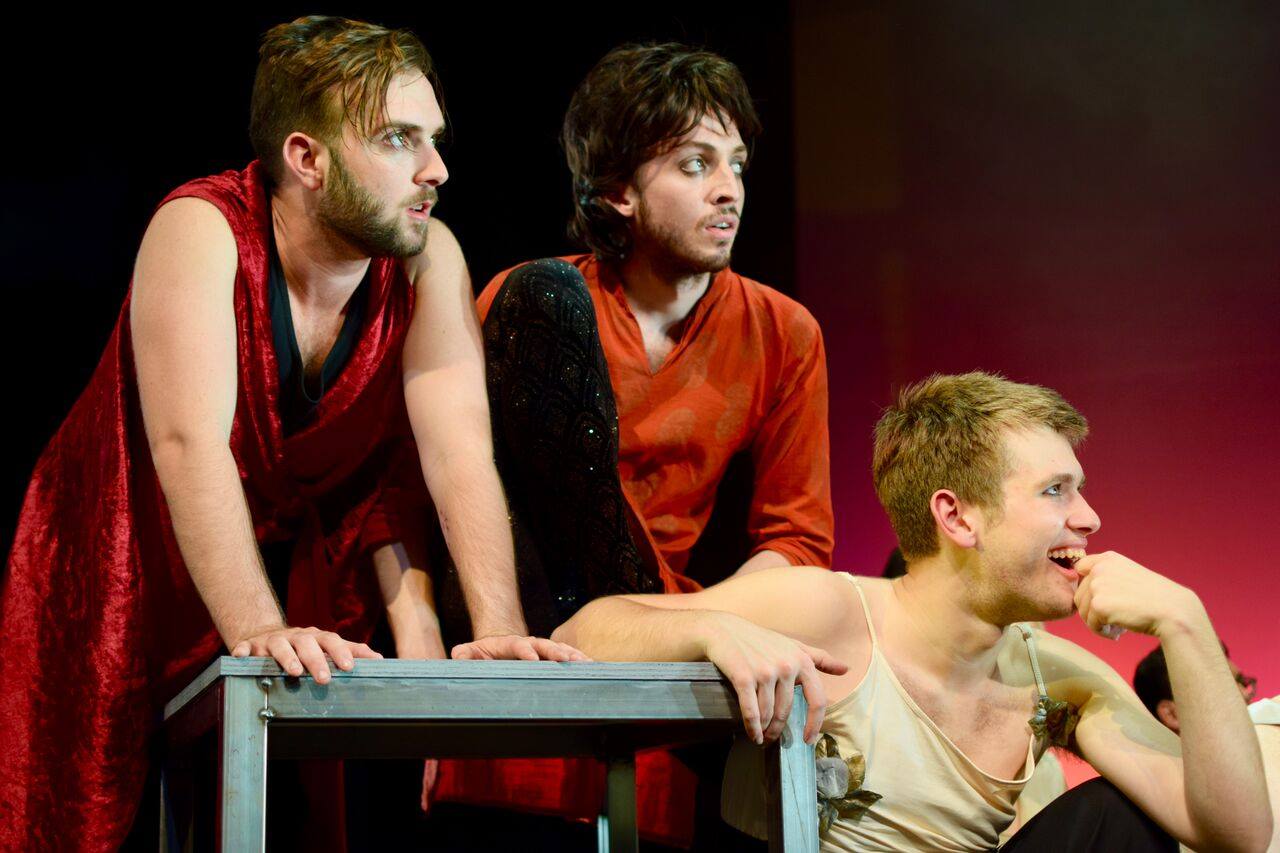The Oxford Greek Play is an august tradition, providing a special opportunity every three years to see a performance of a Classical tragedy in the original language. Despite its many strengths, however, this year’s performance of Euripides’ Bacchae – the story of how the god of revelry returns to Thebes to wreak bloody revenge on his mother’s family – leaves the spectator wishing that its creators had been a bit less traditional in their staging of such a potentially powerful play.
In his director’s notes, Sean Kelly acknowledges that choosing the theme of gender as the main focus of this production presented him with a number of delicate problems concerning casting and staging. Unfortunately, the slightly apologetic tone he takes at this point seems justified by the results of some his choices.
The decision to have Dionysos played simultaneously by three actors was a bold one which felt in keeping with the character’s multifaceted nature – part man, part god, and part beast – and Derek Mitchell, Harry Lukakis and Marcus Knight- Adams worked well together to form a capricious and frightening triumvirate. However, by failing to give the members of the trio any distinguishing features or to identify them with particular aspects of the protagonist’s self, the director left the purpose of this device somewhat unclear and under-developed.
In addition, given that Kelly specifically writes that “Dionysos is not confined to a gender binary”, having all three of the deity’s incarnations played by male coded actors also seems to be a missed opportunity.
Indeed, the general reluctance to cross-cast any major male roles felt oddly conservative for a play so rich in themes of feminine power and gender fluidity (one character, Tiresias, is famous in mythology for having swapped sexes). No female actor spoke a non-chorus line until the final scenes of the play, and even half the chorus of maenad women were played by men.
Given that Dionysos is the god of mad excess and the play revolves around the inner struggle between savagery and civilisation, another thing that prevented it from achieving its full potential was that the cast too often held themselves back. The choreography had plainly been arranged with considerable care and imagination by Isobel Hambleton, and was ably executed by the chorus. However, its stylised precision sometimes felt at odds with the ‘bacchic frenzy’ that the maenads sing about.
Some more rough-around-the-edges physicality would have been welcome – one of the most raw and chaotic scenes, in which the maenads exult over Dionysos breaking free from his prison, was also one of the show’s most effective.
Although King Pentheus represents the counterpoint to the unconstrained debauchery of the revellers, Spencer Klavan’s portrayal of this character could have also used a little extra forcefulness. His Pentheus came across as peevish and pernickety rather than disciplined and dictatorial. A more macho performance in the earlier scenes would have given the character’s subsequent reversal of fortune – when he is emasculated by Dionys0s’ trickery, then infantilised and placed at the mercy of his mother – even greater impact.
That said, there are still many areas in which the production succeeds. The cast are to be commended for the considerable feat of mastering an entire play in a dead language, and, in general, the ancient Greek was delivered with clarity and poetic power. Bill Freeman as First Messenger and Emilia Clark as Agave were particularly noteworthy for their fluent, naturalistic delivery. The scenery was simple but effective, with a giant cage-like cube serving as a prison, portico, and dressing-room as required.
Some shrewd decisions were also made to work round certain conventions of ancient Athenian drama which often prove onerous to modern audiences. Notably, the ponderous tradition of replacing all action scenes with a messenger’s monologue describing them was circumvented with the help of a well-shot film, which was projected onstage to accompany narration of the show’s climax in which Pentheus is hunted down and dismembered by his own family (I would say spoiler alert, but the play has been out for 2400 years, so you’ve had time to learn the twist ending).
In sum, this is a production not lacking in good ideas and technical accomplishment, but a reluctance to go for broke and embrace the bacchic spirit prevented it from fully living up to its promise.



